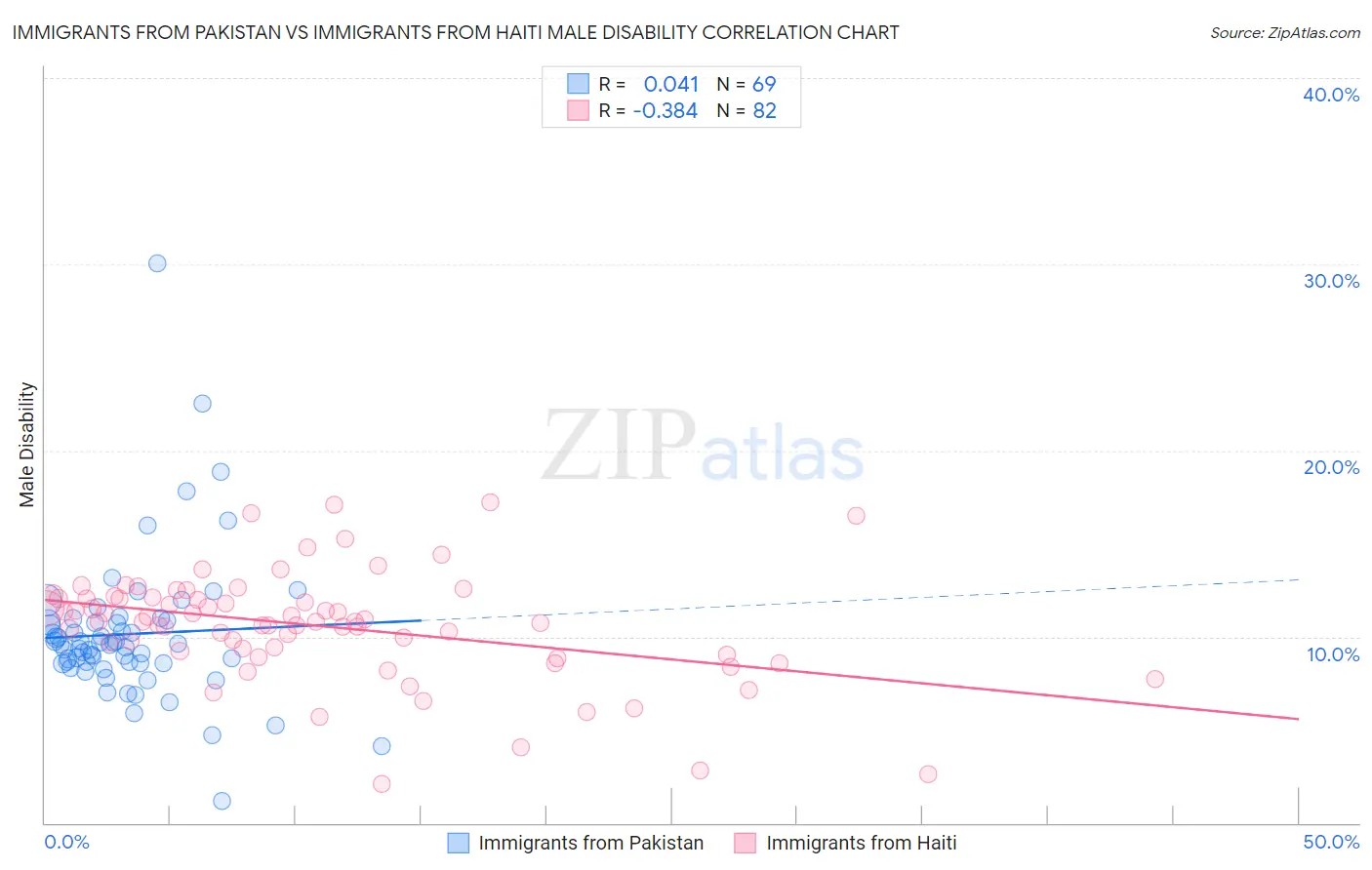Immigrants from Pakistan vs Immigrants from Haiti Male Disability
COMPARE
Immigrants from Pakistan
Immigrants from Haiti
Male Disability
Male Disability Comparison
Immigrants from Pakistan
Immigrants from Haiti
9.8%
MALE DISABILITY
100.0/ 100
METRIC RATING
18th/ 347
METRIC RANK
11.1%
MALE DISABILITY
65.3/ 100
METRIC RATING
162nd/ 347
METRIC RANK
Immigrants from Pakistan vs Immigrants from Haiti Male Disability Correlation Chart
The statistical analysis conducted on geographies consisting of 283,893,374 people shows no correlation between the proportion of Immigrants from Pakistan and percentage of males with a disability in the United States with a correlation coefficient (R) of 0.041 and weighted average of 9.8%. Similarly, the statistical analysis conducted on geographies consisting of 225,231,442 people shows a mild negative correlation between the proportion of Immigrants from Haiti and percentage of males with a disability in the United States with a correlation coefficient (R) of -0.384 and weighted average of 11.1%, a difference of 12.9%.

Male Disability Correlation Summary
| Measurement | Immigrants from Pakistan | Immigrants from Haiti |
| Minimum | 1.2% | 2.1% |
| Maximum | 30.0% | 17.2% |
| Range | 28.8% | 15.1% |
| Mean | 10.1% | 10.6% |
| Median | 9.6% | 10.8% |
| Interquartile 25% (IQ1) | 8.6% | 9.2% |
| Interquartile 75% (IQ3) | 10.8% | 12.1% |
| Interquartile Range (IQR) | 2.2% | 2.8% |
| Standard Deviation (Sample) | 4.0% | 2.9% |
| Standard Deviation (Population) | 4.0% | 2.9% |
Similar Demographics by Male Disability
Demographics Similar to Immigrants from Pakistan by Male Disability
In terms of male disability, the demographic groups most similar to Immigrants from Pakistan are Immigrants from Korea (9.8%, a difference of 0.56%), Okinawan (9.8%, a difference of 0.70%), Immigrants from Sri Lanka (10.0%, a difference of 1.2%), Asian (10.0%, a difference of 1.2%), and Indian (Asian) (9.7%, a difference of 1.3%).
| Demographics | Rating | Rank | Male Disability |
| Immigrants | Eastern Asia | 100.0 /100 | #11 | Exceptional 9.6% |
| Bolivians | 100.0 /100 | #12 | Exceptional 9.6% |
| Iranians | 100.0 /100 | #13 | Exceptional 9.7% |
| Immigrants | Iran | 100.0 /100 | #14 | Exceptional 9.7% |
| Indians (Asian) | 100.0 /100 | #15 | Exceptional 9.7% |
| Okinawans | 100.0 /100 | #16 | Exceptional 9.8% |
| Immigrants | Korea | 100.0 /100 | #17 | Exceptional 9.8% |
| Immigrants | Pakistan | 100.0 /100 | #18 | Exceptional 9.8% |
| Immigrants | Sri Lanka | 100.0 /100 | #19 | Exceptional 10.0% |
| Asians | 100.0 /100 | #20 | Exceptional 10.0% |
| Burmese | 100.0 /100 | #21 | Exceptional 10.0% |
| Immigrants | Venezuela | 100.0 /100 | #22 | Exceptional 10.0% |
| Cypriots | 100.0 /100 | #23 | Exceptional 10.0% |
| Immigrants | Asia | 100.0 /100 | #24 | Exceptional 10.0% |
| Immigrants | Malaysia | 99.9 /100 | #25 | Exceptional 10.0% |
Demographics Similar to Immigrants from Haiti by Male Disability
In terms of male disability, the demographic groups most similar to Immigrants from Haiti are Immigrants from West Indies (11.1%, a difference of 0.020%), Albanian (11.1%, a difference of 0.070%), Immigrants from Kenya (11.1%, a difference of 0.090%), Guatemalan (11.1%, a difference of 0.12%), and British West Indian (11.1%, a difference of 0.15%).
| Demographics | Rating | Rank | Male Disability |
| Immigrants | Middle Africa | 70.9 /100 | #155 | Good 11.1% |
| Russians | 69.8 /100 | #156 | Good 11.1% |
| Immigrants | Western Africa | 69.2 /100 | #157 | Good 11.1% |
| Latvians | 68.1 /100 | #158 | Good 11.1% |
| Guatemalans | 67.2 /100 | #159 | Good 11.1% |
| Albanians | 66.5 /100 | #160 | Good 11.1% |
| Immigrants | West Indies | 65.7 /100 | #161 | Good 11.1% |
| Immigrants | Haiti | 65.3 /100 | #162 | Good 11.1% |
| Immigrants | Kenya | 63.8 /100 | #163 | Good 11.1% |
| British West Indians | 62.8 /100 | #164 | Good 11.1% |
| Luxembourgers | 61.9 /100 | #165 | Good 11.1% |
| Immigrants | Hungary | 61.2 /100 | #166 | Good 11.1% |
| Immigrants | Southern Europe | 54.4 /100 | #167 | Average 11.2% |
| Immigrants | Latin America | 54.0 /100 | #168 | Average 11.2% |
| Barbadians | 53.4 /100 | #169 | Average 11.2% |